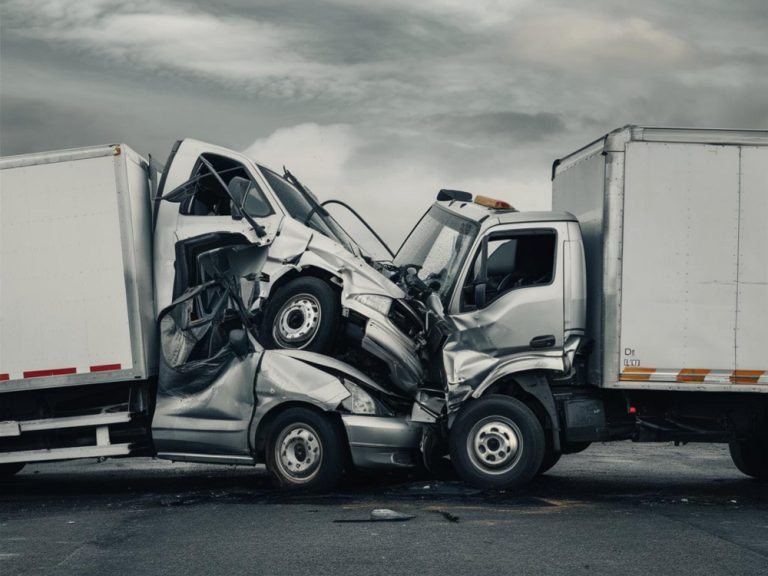1. Illinois Statute of Limitations (735 ILCS 5/13-202)
Under Illinois law, you generally have two years from the date of your accident to file a personal injury lawsuit. This deadline applies to all bodily injury claims, including those caused by truck collisions. If your claim involves property damage only, such as vehicle repairs, the deadline extends to five years under 735 ILCS 5/13-205.
Why it matters: Missing this window can permanently bar your right to recover compensation, no matter how strong your case is. If you are unsure when your time limit runs out, contact us as soon as possible. We can verify your filing deadline and protect your rights from the very beginning.
Read more about how timing affects your case in The Truck Accident Claim Process.
2. Duty to Stop and Report (625 ILCS 5/11-402 and 625 ILCS 5/11-403)
Illinois law requires every driver involved in a crash, especially those operating large commercial vehicles, to stop immediately at the scene, provide contact and insurance information, render aid if someone is injured, and report the accident to law enforcement.
Failure to do so is not just negligent—it is a criminal offense. Truck drivers who flee or fail to report can face license suspension, fines, or even jail time. If you were hit by a truck that fled the scene, we can help identify the vehicle through camera footage, black box data, and police reports.
Learn how evidence is preserved in What Does a Truck Accident Lawyer Do?.
3. Commercial Insurance Requirements (625 ILCS 5/7-601)
Trucking companies and drivers must carry higher insurance coverage than typical passenger vehicles. Illinois law requires minimum liability limits that can range from $750,000 to several million dollars, depending on the cargo type and route.
Federal regulations under the FMCSA (49 CFR §387) also impose additional coverage requirements, especially for hazardous materials, interstate carriers, and passenger transport vehicles. This means there is often more insurance coverage available to pay for your medical bills, lost wages, and pain and suffering.
However, dealing with multiple insurers can be complicated. We coordinate with all parties to ensure every responsible insurer is held accountable. See how compensation is calculated in How Is Compensation Determined After a Semi-Truck Wreck?.
4. Comparative Fault in Illinois (735 ILCS 5/2-1116)
Illinois follows a modified comparative negligence rule, meaning you can recover damages even if you were partly at fault, as long as your share of fault is less than 50%. If you are found 50% or more responsible, you cannot recover damages.
For example, if your total damages are $200,000 but you are found 20% at fault, your compensation would be reduced to $160,000. Insurance companies often try to overstate fault to reduce payouts. Our team pushes back by using police reports, reconstruction experts, and witness statements to prove the truck driver’s true liability.
Learn more about liability in Who Is Liable in a Truck Accident?.
5. Federal Trucking Regulations (FMCSA Rules)
Truck drivers and carriers operating across state lines must comply with Federal Motor Carrier Safety Administration (FMCSA) regulations. These include:
- Hours-of-Service Limits (49 CFR §395): Drivers can only operate up to 11 hours after 10 consecutive off-duty hours.
- Vehicle Maintenance (49 CFR §396): Trucks must be regularly inspected and documented.
- Drug and Alcohol Testing (49 CFR §382): Mandatory pre-employment, random, and post-accident testing.
- Weight and Load Restrictions: Overloaded or improperly secured cargo can cause catastrophic crashes.
We review the driver’s logbooks, electronic records, and inspection reports to identify violations. Even a single FMCSA breach can establish negligence and strengthen your case.
6. Chicago-Specific Ordinances and Truck Routes
Chicago enforces specific truck routing rules to control heavy vehicle traffic. The Chicago Municipal Code (Chapter 9-72) restricts truck operations on certain residential streets and mandates designated truck routes. If a truck driver violates these routes, such as cutting through a prohibited area, that can serve as evidence of recklessness or negligence.
Additionally, city data identifies high-risk intersections such as the I-90/I-94 Kennedy Expressway merge zones, Cicero Avenue near Midway, and the Pulaski Road industrial corridor. We use this data to support accident reconstruction and prove that a crash occurred in a known hazard zone.
7. Damages and Compensation Under Illinois Law
Illinois law allows victims of truck accidents to recover both economic and non-economic damages, including medical expenses, lost wages, property damage, pain and suffering, emotional distress, and loss of companionship. Punitive damages may also apply if the trucking company acted with gross negligence, such as forcing drivers to exceed legal hours or falsifying maintenance logs.

8. Wrongful Death and Survival Actions
If a loved one was killed in a truck accident, Illinois law provides two legal paths:
- Wrongful Death Act (740 ILCS 180/1): Allows surviving family members to recover damages for loss of support, companionship, and emotional grief.
- Survival Act (755 ILCS 5/27-6): Allows the estate to recover damages the deceased could have claimed if they had survived, such as medical expenses and pain.
We handle both types of cases with compassion and precision to ensure every family receives justice and financial stability after an unimaginable loss.
Learn more in What To Do After a Truck Accident in Chicago.
Why These Laws Matter
Truck accident cases are complex because they combine state, federal, and local laws. If your attorney does not understand how these rules overlap, key evidence can be missed or your claim could be dismissed on a technicality. Our role is to ensure every statute, regulation, and ordinance is leveraged to build the strongest case possible for you.



